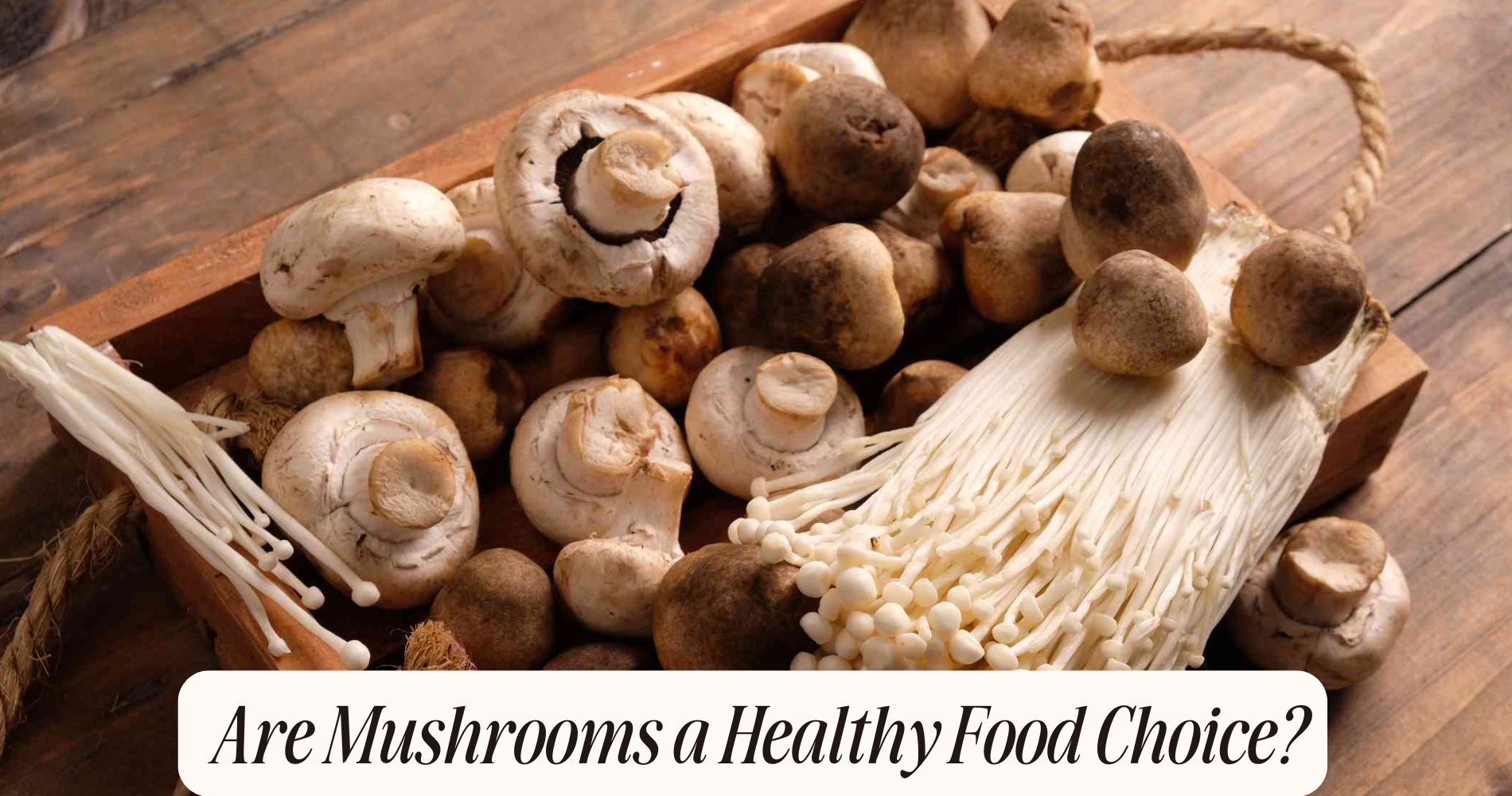
What Do Mushrooms Do for Your Body?
What do mushrooms do for your body? Mushrooms are packed with nutrients that enhance your body's health in various ways. They're low in calories but high in fiber, promoting digestive health and weight management. Their rich antioxidant content, including ergothioneine, helps combat oxidative stress and supports your immune system. Some varieties, like shiitake, can lower LDL cholesterol, benefiting heart health. Additionally, certain mushrooms may improve cognitive function by stimulating nerve growth. Their skin-friendly properties can lead to a more youthful appearance. Incorporating mushrooms into your meals not only adds flavor but boosts nutrition, offering countless benefits you can explore further.
Nutritional Profile of Mushrooms
Mushrooms pack a powerful nutritional punch, offering a unique blend of vitamins, minerals, and antioxidants that can benefit your health. These fungi come in various mushroom varieties, each with distinct nutritional profiles. For instance, shiitake mushrooms are rich in B vitamins, which support energy metabolism, while portobello mushrooms are an excellent source of potassium, aiding in heart health.
When it comes to culinary uses, mushrooms are incredibly versatile. You can sauté, grill, or roast them to enhance their earthy flavors. Adding them to salads, soups, and stir-fries not only boosts the taste but also enriches your meals with essential nutrients.

For example, the antioxidant ergothioneine found in mushrooms may help protect your cells from oxidative stress.
Mushrooms are also low in calories and fat, making them a fantastic choice for those looking to maintain a healthy weight. With their high fiber content, they promote digestive health and can keep you feeling full longer.
Whether you're incorporating button, oyster, or enoki mushrooms into your diet, you're making a nutritious choice that supports overall well-being.
Immune System Support
Mushrooms are packed with nutrients that can enhance your immune system, providing essential vitamins and minerals your body needs.
Their high antioxidant content helps combat oxidative stress, which can weaken your defenses.
Nutrient Density Benefits
A diverse array of nutrients found in mushrooms can considerably bolster your immune system. Different mushroom varieties, such as shiitake, reishi, and maitake, are packed with essential vitamins, minerals, and bioactive compounds that play significant roles in immune function.
For instance, shiitake mushrooms contain polysaccharides like lentinans, which enhance the activity of immune cells, helping your body fend off infections more effectively.
Moreover, the B vitamins in mushrooms support overall health applications by boosting energy levels and helping to reduce fatigue, which is essential for maintaining a strong immune response.
Vitamin D, often found in mushrooms exposed to sunlight, is another key player; it regulates immune responses and can help prevent respiratory infections.
Additionally, minerals like selenium and copper present in various mushroom types help protect against oxidative stress, further supporting immune health.
Incorporating these nutrient-dense mushrooms into your diet can be a simple yet effective way to elevate your immune system's resilience.
Antioxidant Properties Explained
In addition to their nutrient density benefits, mushrooms also serve as a potent source of antioxidants that can markedly bolster your immune system. Various mushroom varieties, such as shiitake, maitake, and reishi, are rich in compounds like ergothioneine and selenium, both known for their powerful antioxidant properties. These antioxidants help neutralize free radicals, which can cause cellular damage and increase inflammation.
When you consume mushrooms, you're not just enjoying their unique flavors; you're also reaping significant health benefits. For instance, studies have shown that the antioxidants in mushrooms can enhance the activity of immune cells, making your body more efficient at fighting off infections and diseases.
Additionally, these properties can help reduce the risk of chronic illnesses, such as heart disease and cancer, by protecting your cells from oxidative stress.
Incorporating a variety of mushrooms into your diet can optimize these health benefits, as each type brings its own unique set of antioxidants. So, whether you're adding them to soups, stir-fries, or salads, you're doing wonders for your immune system and overall health.
Antioxidant Properties
Mushrooms are packed with antioxidants that help neutralize free radicals in your body, reducing oxidative stress.
This process not only protects your cells from damage but also supports your immune system, enhancing its ability to fight off illness.
Free Radical Neutralization
Harnessing the power of antioxidants, mushrooms play an essential role in neutralizing free radicals in your body. These harmful molecules are produced during normal metabolic processes and can lead to oxidative stress, which contributes to various health issues, including inflammation and chronic diseases. The unique mushroom compounds, such as ergothioneine and glutathione, are particularly effective in combating oxidative damage.
When you consume mushrooms, you're not just adding flavor to your meals; you're also bolstering your body's defense system against free radicals. Research indicates that these antioxidants can help reduce the burden of oxidative stress, protecting your cells from damage. For instance, ergothioneine has been shown to scavenge free radicals and may even improve cellular health.

Regularly incorporating mushrooms into your diet can enhance your overall well-being. By actively neutralizing free radicals, these fungi help maintain cellular integrity and promote longevity.
Immune System Support
Antioxidants not only combat free radicals but also play a significant role in supporting your immune system. When you include various mushroom varieties in your diet, you're tapping into a rich source of these powerful compounds.
Mushrooms like shiitake, maitake, and reishi are particularly known for their immune-boosting properties. They contain polysaccharides, such as beta-glucans, which enhance the activity of immune cells, making them more effective at fighting off infections.
Studies have shown that these mushroom varieties can increase the production of cytokines, signaling proteins that help regulate immune responses. Additionally, the antioxidant properties of mushrooms help reduce inflammation, another key factor in maintaining a healthy immune system.
Incorporating mushrooms into your meals can be an easy way to enhance your overall health. Whether you add them to soups, salads, or stir-fries, you're providing your body with essential nutrients that can bolster your defenses.
Heart Health Benefits
When it comes to supporting heart health, incorporating mushrooms into your diet can really pay off. Research shows that mushrooms, particularly varieties like shiitake and oyster, offer compounds that promote cholesterol reduction. These fungi contain beta-glucans and other polysaccharides that can help lower LDL (bad cholesterol) levels, which is vital for maintaining a healthy heart.
Additionally, mushrooms are a low-sodium food, making them a great choice for managing blood pressure. The potassium found in mushrooms helps to balance sodium levels in your body, which can contribute to better cardiovascular health. By including mushrooms in your meals, you not only add flavor but also enhance your nutrient intake, aiding in blood pressure regulation.
Moreover, mushrooms are packed with antioxidants, such as ergothioneine, which combat oxidative stress and inflammation—both linked to heart disease. Their high fiber content also supports healthy digestion, indirectly benefiting heart health by promoting overall wellness.
Incorporating a variety of mushrooms into your diet can be a delicious and effective strategy for supporting heart health, helping you maintain an active, healthy lifestyle.
Weight Management Aid
Mushrooms can be a powerful ally in your weight management journey. Their low calorie count and high fiber content make them an excellent choice for filling meals without adding excess calories. Different mushroom varieties, such as shiitake, portobello, and cremini, offer unique flavors and textures to enhance your dishes. Incorporating these mushrooms into your meals can help you feel satisfied and curb cravings.
When it comes to cooking methods, you've got plenty of options. Sautéing mushrooms with olive oil can add depth to stir-fries, while roasting them brings out their natural umami flavor. You can also add mushrooms to soups, salads, or even use them as a meat substitute in tacos or burgers, which can considerably reduce calorie intake.

A study published in the journal Nutrients highlighted that participants who included mushrooms in their diets reported lower body weight and improved satiety. By integrating mushrooms into your meals, you not only enjoy their delicious taste but also gain a healthful boost that supports your weight management goals.
Cognitive Function Enhancement
Numerous studies suggest that incorporating mushrooms into your diet can markedly enhance cognitive function. Certain varieties, such as lion's mane, have gained attention for their potential to promote brain health. Research indicates that lion's mane mushrooms may stimulate the production of nerve growth factor (NGF), a protein essential for the survival and function of neurons. This stimulation can lead to improved memory and cognitive performance.
Additionally, mushrooms like shiitake and maitake are rich in antioxidants, which can help combat oxidative stress in the brain. Oxidative stress has been linked to cognitive decline and neurodegenerative diseases, so including these mushrooms could be a proactive step towards maintaining mental sharpness.
Moreover, the unique polysaccharides found in many mushrooms may also contribute to a memory boost. These compounds can enhance communication between brain cells, further supporting cognitive functions.
Skin Health Improvement
The vibrant colors and unique textures of mushrooms not only make them a culinary delight but also a powerful ally for your skin health. Various mushroom varieties, like shiitake and reishi, are packed with antioxidants that combat free radicals, helping to maintain youthful skin. These antioxidants can reduce the appearance of fine lines and wrinkles, giving your skin a smoother look.
Moreover, mushrooms are rich in polysaccharides, which are known to enhance skin hydration. When you incorporate mushrooms into your diet, you're not just adding flavor; you're also boosting your skin's moisture retention. This is particularly beneficial for those with dry or sensitive skin, as mushrooms help to create a protective barrier, locking in hydration and preventing moisture loss.
Additionally, certain mushroom varieties contain compounds that can soothe inflammation, making them effective for those dealing with conditions like acne or eczema. By adding mushrooms to your meals or even using mushroom-based skincare products, you'll harness their skin-enhancing properties.
Digestive Health Contribution
When you're looking to enhance your digestive health, incorporating mushrooms into your diet can be a game-changer. These fungi aren't just flavorful additions; they also pack a nutritional punch that supports your gut.
One of the standout features of mushrooms is their impressive fiber content. Fiber is essential for maintaining a healthy digestive system, as it promotes regular bowel movements and prevents constipation.
Moreover, certain types of mushrooms, like shiitake and maitake, provide probiotic benefits. Probiotics are beneficial bacteria that help balance your gut microbiome, leading to improved digestion and overall gut health. A balanced microbiome can help reduce bloating, gas, and other digestive discomforts.

Additionally, mushrooms contain polysaccharides, which serve as prebiotics, feeding the good bacteria in your gut. This helps enhance the effectiveness of the probiotics, creating a more robust digestive environment.
Incorporating Mushrooms Into Meals
Incorporating mushrooms into your meals can elevate both flavor and nutrition in just a few simple steps. With various mushroom varieties like shiitake, cremini, and portobello, you can enhance your dishes while reaping health benefits. Shiitake mushrooms are rich in beta-glucans, which support immune function, while portobello adds a hearty texture to vegetarian meals.
When it comes to cooking methods, you've got plenty of options. Sautéing mushrooms with garlic and olive oil brings out their umami flavor, making them a perfect addition to pasta or stir-fries. You can also grill portobellos for a delicious burger alternative or roast a mix of mushrooms for a savory side dish.
If you're looking for something unique, try adding them to soups or stews; their flavors deepen as they cook.
Don't forget about incorporating mushrooms into breakfast! Adding them to omelets or breakfast burritos can boost the nutritional profile of your morning meal.
With these simple strategies, you can easily enjoy the myriad benefits of mushrooms while enhancing the taste of your favorite dishes. So go ahead, get creative in the kitchen, and let mushrooms take center stage!
Experience Full-Body Benefits with 10-IN-1 MUSHROOM GUMMIES
If you're exploring what do mushrooms do for your body, consider Well Gummies’ 10-IN-1 MUSHROOM GUMMIES as a simple way to experience their full range of benefits. Packed with 10 powerful mushrooms, including reishi, these vegan-friendly gummies fuel your brain, support immune health, and provide sustained, calm energy for sharper focus and overall wellness. With a delicious wild berry flavor, they’re as enjoyable as your favorite candy. No jitters, no crash—just balanced energy to keep you feeling your best. Elevate your daily wellness routine with these easy-to-use, nutrient-packed gummies.
Frequently Asked Questions
Can Mushrooms Help With Allergies or Asthma Symptoms?
Mushrooms can provide immune support, potentially helping to alleviate allergy and asthma symptoms. Their anti-inflammatory properties and nutrients may reduce reactions, offering you mushroom benefits that contribute to better respiratory health and overall wellness.
Are There Any Specific Types of Mushrooms for Athletes?
Certain mushrooms, like Cordyceps and Reishi, can boost your performance enhancement and recovery support. They enhance endurance, reduce fatigue, and promote muscle recovery, making them beneficial additions to an athlete's diet. Give them a try!
Do Mushrooms Have Any Side Effects or Contraindications?
Mushrooms can cause side effects like gastrointestinal discomfort in sensitive individuals. You should be cautious if you have mushroom allergies or sensitivities, as reactions may vary from mild to severe, depending on the type and amount consumed.
How Do Mushrooms Interact With Medications?
Mushrooms can influence drug interactions through their unique mushroom metabolism. Some compounds may alter how your body processes medications, affecting efficacy or side effects. Always consult your healthcare provider before combining mushrooms with any medication.
Are There Any Mushrooms That Are Toxic or Harmful?
Yes, there are toxic mushrooms. You should learn toxic mushroom identification to avoid harmful mushroom effects, like liver damage or gastrointestinal distress. Always consult experts and verify before consuming any wild mushrooms to guarantee safety.
Conclusion
Incorporating mushrooms into your diet can greatly enhance your overall health. Their rich nutritional profile supports various bodily functions, from boosting your immune system to promoting heart health and aiding digestion. With their antioxidant properties and potential cognitive benefits, mushrooms are a versatile food that can help you maintain a balanced lifestyle. By adding them to your meals, you're not just enjoying their unique flavors, but also investing in your long-term well-being. Don't miss out on their benefits!




